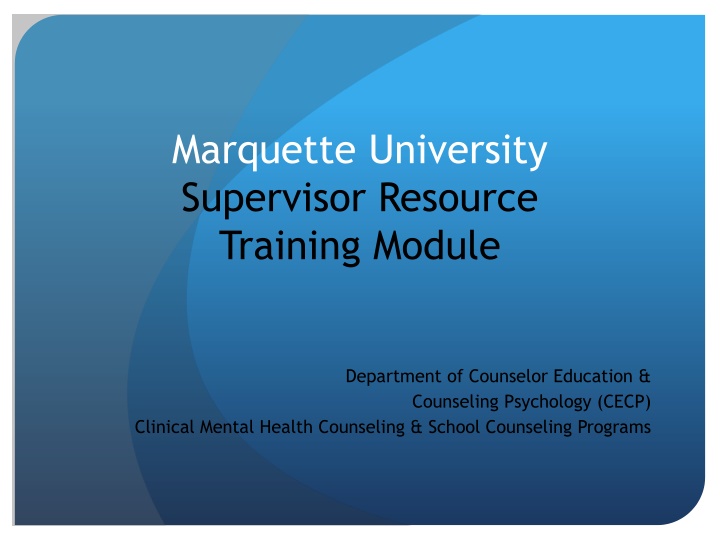
Marquette University Supervisor Resource Training Module
Explore Marquette University's Supervisor Resource Training Module offered by the Department of Counselor Education & Counseling Psychology, focusing on Clinical Mental Health Counseling and School Counseling Programs. The training covers program philosophy, practicum/internship supervision, specific requirements for students and site supervisors, and effective supervisory relationships. The Master's programs in counseling include courses, clinical training, and CACREP core curricular areas. Student learning outcomes emphasize applying knowledge, professional standards, advocacy, self-awareness, and critical interventions in diverse settings.
Download Presentation

Please find below an Image/Link to download the presentation.
The content on the website is provided AS IS for your information and personal use only. It may not be sold, licensed, or shared on other websites without obtaining consent from the author. If you encounter any issues during the download, it is possible that the publisher has removed the file from their server.
You are allowed to download the files provided on this website for personal or commercial use, subject to the condition that they are used lawfully. All files are the property of their respective owners.
The content on the website is provided AS IS for your information and personal use only. It may not be sold, licensed, or shared on other websites without obtaining consent from the author.
E N D
Presentation Transcript
Marquette University Supervisor Resource Training Module Department of Counselor Education & Counseling Psychology (CECP) Clinical Mental Health Counseling & School Counseling Programs
Components of the Training Module CECP Master s program information CECP Program philosophy regarding practicum/internship and supervision Specific requirements of our practicum/intern students and of our site supervisors Issues that require attention in creating an effective supervisory relationship and experience
Firsta thank you! We could not offer such unique training opportunities and strong supervision without supervisors like you, and we truly value your contributions. Thank you for all of the time and expertise you give the Counselor Education students here at Marquette.
Masters Programs in Counseling Our master s programs in counseling includes a variety of courses and clinical training experiences that offer comprehensive preparation for professional practice as a counselor in various clinical and school settings. Training in counseling skills and a practicum experience begins in the first year, and an internship usually begins in the second year.
Masters Programs in Counseling Our programs are based on CACREP 8 core curricular areas (2009, 2016): 1. Professional Orientation And Ethical Practice 2. Social And Cultural Diversity 3. Human Growth And Development 4. Career Development 5. Helping Relationships 6. Group Work 7. Assessment 8. Research And Program Evaluation
CECP Masters Programs Student Learning Outcomes 1. Apply knowledge of bio-psycho-social-cultural foundations of behavior and evidence-based counseling approaches to diverse individuals and groups. 2. Apply professional, ethical, and legal standards in their counseling practices. 3. Assume advocacy roles for the mental health care of underserved individuals and groups in urban settings. 4. Integrate self-awareness, counseling roles and reflective practices into a professional counseling identity. 5. A. Lead the development and implementation of critical interventions of a Comprehensive School Counseling Program* in culturally diverse, urban PK-12 schools. (SC Program) B. Provide clinical mental health counseling prevention and treatment services for diverse individuals and groups in community settings. (CMHC Program)
CECP Commitment to Racial and Social Justice Our program faculty, staff and students believe it is our responsibility to actively engage in creating a more equitable, diverse, and inclusive world. We value and embrace diversity across all forms of identity. We acknowledge the complexity of diversity as it relates to privilege and the disparities of racial and social power impacting our society. It is our duty to dismantle discriminatory systems, and we are committed to doing so through our research, practice, and service. As members of an academic community, we believe that diversity enriches our educational and professional growth, as well as our communities. We dedicate ourselves to increasing self-awareness, growth, collaboration, relationship- building, and ongoing education. In our quest for racial and social justice, we advocate with, and for, those in our communities whose voices deserve to be heard. We are committed to taking personal and group responsibility for racial and social justice, and to hold one another accountable.
CECP Masters Programs Descriptions School Counseling Our Master of Arts in School Counseling offers comprehensive preparation for professional practice as a school counselor. Students are trained in the ASCA National Model (2012) and the Wisconsin Comprehensive School Counseling Model (WCSC; 2007). -This program requires 48 credits for completion Clinical Mental Health Counseling Our Master of Science in Clinical Mental Health Counseling is dedicated to training professional counselors in evidence-based and emerging best practices and prepares students to practice as a professional clinical mental health counselor. -This program requires 60 credits for completion -This program has 3 optional specializations: *Child/Adolescent Counseling *Addictions Counseling *Clinical Rehabilitation Counseling
Counseling Practicum (COUN 6965) Practicum is described as a distinctly defined, supervised clinical experience in which the student develops basic counseling skills and integrates professional knowledge (CACREP, 2016). The Counseling programs require that students complete a minimum of 100 hours of Counseling Practicum (COUN 6965) over the course of one semester. Generally this practicum experience takes place in the 2ndsemester of a student s first year in the program.
Internship in Counseling (COUN 6986) Internship can be described as a distinctly defined, post-practicum, supervised clinical experience in which the student refines and enhances basic counseling or student development knowledge and skills, and integrates and authenticates professional knowledge and skills related to program objectives (CACREP, 2016). The Counseling Programs require that students complete at least two semesters of Counseling Internship (COUN 6986). This includes at least 300 clock hours each semester, or approximately 20 hours per week over 15 weeks per semester, for a total of 600 hours.
Site Supervisor Qualifications Site supervisors must have the following qualifications: 1. A minimum of a master s degree in counseling or a related profession with equivalent qualifications, including relevant certifications and/or licenses. 2. A minimum of two years of pertinent professional experience in the specialty area in which the student is enrolled. 3. Knowledge of the program s expectations, requirements, and evaluation procedures for students. 4. Relevant training in counseling supervision. (CACREP, 2016, Section III).
What is supervision? An intervention provided by a more senior member of a profession to a more junior member or members of that same profession. This relationship is: Evaluative Extends over time Enhances professional competency Supervisors: Monitors quality of professional services offered Serve as a gate-keeper for those who enter the profession (Bernard & Goodyear, 2019)
Definition of supervision, continued Supervision is a collaborative process where someone more experienced engages those less experienced to find their voice as a person and a professional by: Empowering Teaching Modeling Challenging Evaluating (Georgia Southern University Site Supervisor Workshop, 2013 )
Empowering Examples: Building the supervisor relationship Focusing on positives and strengths Encouraging, affirming, and advocating for the supervisee Supporting supervisees in their learning goals Allowing supervisees to explore various types of cases (Georgia Southern University Site Supervisor Workshop, 2013)
Teaching Examples: Imparting knowledge about the counseling profession Sharing with students the art and craft of the profession Relying on ethical standards Employing different theoretical approaches Teaching practical and case conceptualization skills (Georgia Southern University Site Supervisor Workshop, 2013 )
Modeling Examples: Professional and ethical behavior Counseling skills & techniques A commitment to the profession professional integrity Sincere caring and concern for the clients Ways to provide feedback (Georgia Southern University Site Supervisor Workshop, 2013 )
Challenging Examples: Confronting with the true spirit of caring in mind Creating healthy tension in the learning process Sensitivity to the right learning moments Setting high expectations Acknowledging your supervisee s capabilities Challenging them to take risks Encouraging supervisees to use self-reflection (Georgia Southern University Site Supervisor Workshop, 2013 )
Evaluation CECP Evaluation Methods: Classroom Performance (case presentations, etc.) Video/Audio Taping and/or Live Supervision Completion of hours and documentation Supervisor Evaluation of Student Form
CECP Supervisor Evaluation of Student Form: Areas of Evaluation I. Basic Professional Work Requirements II. Professional Ethics and Behaviors III. Counseling Knowledge and Skills a. b. c. Knowledge and Application of Treatment Approaches Self-Development & Self-Care Response to Supervision V.Interactions with Clients and Coworkers VII. Counseling Records, Forms, and Reports
Characteristics of Effective Supervisors Clarifies expectations and style of supervision Maintains consistent and appropriate boundaries Has knowledge of theory and current research Teaches practical skills Teaches case conceptualization Provides frequently scheduled supervision Is accessible and available Encourages the exploration of new ideas and techniques Fosters autonomy Models appropriate ethical behavior Has a personalized therapeutic style Is personally and professional mature Is willing to serve as a model Perceives growth as an ongoing process Is able to assess learning needs of the supervisee Provides constructive feedback and positive reinforcement Is invested in the supervisees development Has awareness of personal power Has the courage to expose vulnerabilities, make mistakes, and take risks Is nonauthoritarian and nonthreatening Accepts and celebrates diversity Has the ability to communicate effectively Is willing to use their imagination Is aware and accepts on limitations and strengths Works collaboratively
Frequently Asked Questions for Supervising CECP Students I have questions about my role as a supervisor and the supervision requirements. Where do I get this information? This information can be found in the Practicum and Internship Handbook (see the Supervisor Resources webpage). You can also contact the course instructor at any time to ask questions. Will Marquette faculty visit my supervisee on site during the semester? Yes. The course instructor will conduct several site visits with you and the student. During practicum, you can expect an initial and final site visit during the semester, in addition to biweekly (in person or phone) consultation. For internship, you can expect one site visit at the beginning, middle and end of the internship experience (usually one year).
Frequently Asked Questions for Supervising CECP Students If I have a concern about a supervisee and would like to communicate that to the program, who should I contact? The first person to contact would be the course instructor. You can always contact the director of the master s programs as well. I have feedback to share with the department about areas of training that can be strengthened. Who should I contact? Feel free to share this information with the course instructor, the practicum and internship coordinator, or the director of counselor education. Their contact information can be found on the Supervisor Resources webpage.
Resources Please see our additional resources on the Supervisor Resources Page: https://www.marquette.edu/education/graduate/cecp- supervisor-resources.php





















